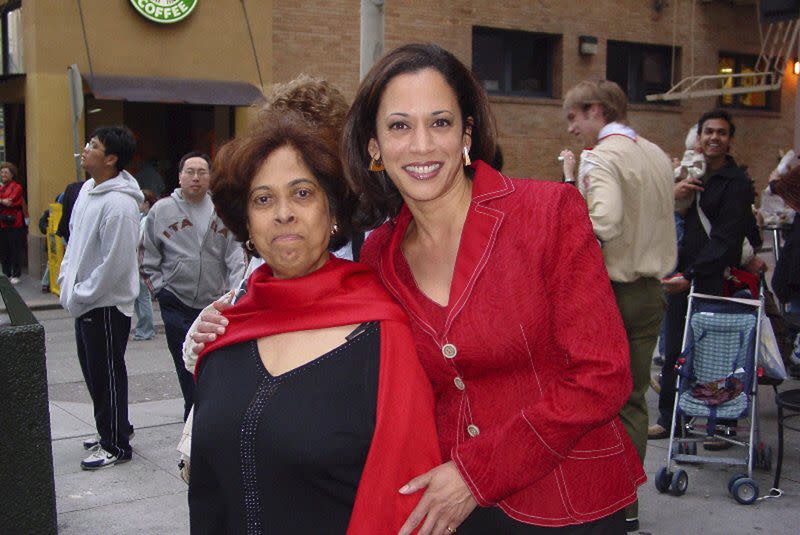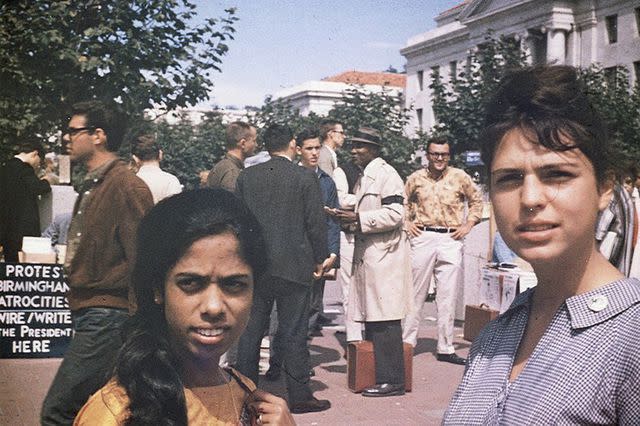Who Was Kamala Harris' Mom Shyamala Gopalan Harris? All About the Late Breast Cancer Researcher and How She Inspired Her Daughter’s Political Career
Vice President Kamala Harris has often spoken about her mother's influence on her and her passion for politics

Kamala Harris credits her mother, Shyamala Gopalan Harris, with informing her worldview and inspiring her to break glass ceilings in her own career.
The vice president was born to Shyamala, an immigrant from India, and her father, Donald J. Harris, on Oct. 20, 1964. Three years later, they welcomed their second daughter, Maya, in 1967. After the couple divorced in 1972, Shyamala became their daughters' primary caretaker, and the three of them relocated from the Midwest to Northern California.
Shyamala was a prominent breast cancer researcher before her death in 2009 from colon cancer at 70 years old. Though she wasn't present to see Kamala become the first Black and South Asian female vice president of the United States, the current Democratic presidential nominee said in her 2020 DNC nomination acceptance speech that her mom's influence continues to guide her to this day.
Related: Kamala Harris' Parents: All About Her Mom Shyamala Gopalan and Dad Donald J. Harris
“My mother instilled in my sister, Maya, and me the values that would chart the course of our lives," Kamala said. "She raised us to be proud, strong Black women, and she raised us to know and be proud of our Indian heritage. She taught us to put family first — the family you’re born into and the family you choose."
From her journey to the U.S. to her award-winning research, here's everything to know about Kamala Harris' mom, Shyamala Gopalan Harris.
She grew up in India

Kamala Harris/Instagram
Kamala Harris with her sister Maya and mother Shyamala and her mother's parentsShyamala was raised in India as the eldest daughter of a diplomat from a Tamil Brahmin family, according to The New York Times.
When she was an undergraduate student, Shyamala attended Lady Irwin College, which was founded by the British as an opportunity to educate Indian women in science. However, her degree was in home science, which did not fit with her aspirations to be a biochemist.
“My father and I used to tease her like nobody’s business,” her brother, Gopalan Balachandran, told The New York Times in September 2020. “We would say, ‘What do you study in home science? Do they teach you to set up plates for dinner?’ She used to get angry and laugh. She would say, ‘You don’t know what I’m studying.’ ”
When she was 19, Shyamala immigrated from India to the U.S. alone. "Her courage and determination made me who I am today," Kamala wrote on X (formerly Twitter) in November 2024.
Shyamala came to the U.S. to attend the University of California at Berkeley

Kamala Harris Instagram
Shyamala Gopalan at a protest while she was in collegeAfter feeling frustrated with the lack of opportunities, Shyamala decided to pursue an education in the U.S. She applied to the University of California at Berkeley and got into their graduate program in nutritional science — much to her family's trepidation.
While Shyamala's father was shocked and nervous, he wasn't opposed to her going abroad, and even offered to pay for her first year of studies.
“He was only worried: None of us had been abroad," Balachandran told The New York Times in 2020. "He said, ‘I don’t know anybody in the States. I certainly don’t know anybody in Berkeley.’ She said, ‘Father, don’t worry.' "
At age 19, Shyamala moved across the globe to California, where she didn't know a single person.
“She was lonely, and she said it was hard,” Judith Turgeon, a longtime friend and collaborator, told The New York Times in October 2024. “But she pushed on.”
Shyamala found community in the Black students on campus, joining a study group, later known as the Afro-American Association, where she ultimately met Kamala's father. Though she was not Black, former members told The New York Times that she was "accepted as part of the group."
She raised her daughters with the help of the women close to her

Vice President Kamala Harris/Instagram
Kamala Harris with her younger sister Maya Harris and mom Shyamala Gopalan HarrisWhen Kamala was 5 years old, her parents divorced, and she moved back to California with Shyamala and her little sister Maya after living for a few years in the Midwest, where her father worked.
Kamala has spoken about how her mother had a challenging relationship with Donald after their split and didn't have much interest in maintaining communication with him. However, it was important to her that her daughters grew up acquainted with their Black roots, so she moved to the top floor of a rented duplex in a Black neighborhood of West Berkeley, per The New York Times.
As a single working mom, Shyamala relied on her community to support her children, specifically Regina Shelton, a Black woman who ran a daycare on the first floor of the family's duplex. While she worked as an assistant researcher at a lab in UC Berkeley, Kamala and Maya stayed with Shelton — sometimes overnight, if Shyamala's experiments went long, per The New York Times.
Shyamala was a breast cancer researcher

Vice President Kamala Harris/Facebook
Kamala Harris with her mom Shyamala Gopalan Harris as a babyShyamala finished her education with a doctorate in nutrition and endocrinology from UC Berkeley. She then went on to become a distinguished breast cancer researcher, working everywhere from McGill University’s Lady Davis Institute for Medical Research at the Jewish General Hospital in Canada to UC Berkeley's Lawrence Berkeley National Laboratory.
Her work focused on finding out what made breast cancer so deadly, specifically honing on the hormones estrogen and progesterone. When she got passed up for a promotion that went to a White man instead, Shyamala reportedly threatened to take legal action, her peers told The New York Times. The moment inspired her to move to McGill in Montreal, where she worked for 16 years.
Though her work caused her to often be away from her children, Shyamala knew it was important for her daughters to be exposed to different opportunities, so she brought Kamala and Maya along with her sometimes to the lab.
“I had to go, we had to go,” she told Mother Jones in 2007. “And when they got there, I would make them do something."
Kamala has called her one of the most influential people in her life

Kat Wade/San Francisco Chronicle via Getty
Kamala Harris gives her victory speech after becoming the first woman and Afro/Indian American D.A. in California surrounding by her mother, Shyamala Gopalan Harris, brother-in-law Tony West and sister, Maya Harris on 12/10/03 in SanFranciscoKamala has often said that her mother's passion for civil rights and social justice inspired her to pursue her political career.
"She taught us to be conscious and compassionate about the struggles of all people," the vice president said of her mother in her 2020 DNC speech. "To believe public service is a noble cause and the fight for justice is a shared responsibility. That led me to become a lawyer, a district attorney, attorney general and a United States Senator."
In addition to her political stances, Kamala has said her mother's determination to stand up for herself — and her teaching her daughters to do the same — was one of the most valuable things she ever learned from her.
“My mother had another lesson she used to teach: Never let anyone tell you who you are, you show them who you are,” she said during her 2024 DNC speech. “She taught us to never complain about injustice, but do something about it.”
Shyamala told Mother Jones in 2007 nearly the exact same thing, saying she always told her daughters that if they didn't define themselves, someone would for them: “One of the first rules I taught my children is, don’t let anybody tell you who you are. You tell them who you are.”
She died from colon cancer in 2009

AP Photo/George Nikitin
Kamala Harris with her mother Dr. Shyamala Gopalan holding a copy of The Bill of Rights, receives the oath of office from California Supreme Court Chief Justice Ronald M. George, left, during inauguration ceremonies, Jan. 8, 2004, in San FranciscoWhen she was 69 years old, Shyamala was diagnosed with colon cancer, and, two months after her 70th birthday, she died on Feb. 11, 2009. In a 2018 op-ed for The New York Times, Kamala reflected on her time caring for her mother near the end of her life.
In her final weeks, Kamala wrote, one of the last questions Shyamala asked the hospice nurse was, "Are my daughters going to be O.K.?"
"Though I miss her every day, I carry her with me wherever I go," the former senator wrote in the essay, which was adapted from her memoir, The Truths We Hold: An American Journey. "I think of the battles she fought, the values she taught me, her commitment to improve health care for us all."
She concluded, "There is no title or honor on earth I’ll treasure more than to say I am Shyamala Gopalan Harris’s daughter."


